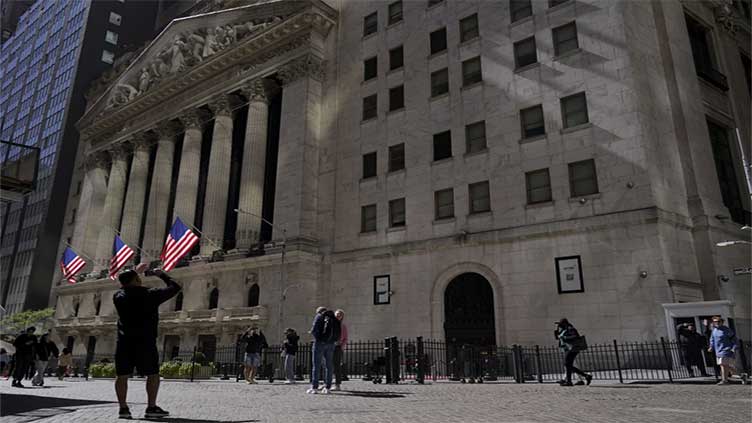A widespread rally sends Wall Street toward records, even as Big Tech falters

Business
A widespread rally sends Wall Street toward records, even as Big Tech falters
NEW YORK (AP) — U.S. stocks are flirting again with their records Tuesday after several big companies delivered better profits for the spring than Wall Street expected.
A widespread rally is pushing five out of every six stocks in the S&P 500 higher, and the index is up 0.3% in afternoon trading and on track to top its all-time high set last week. The Dow Jones Industrial Average was leading the market with a leap of 578 points, or 1.4%, a day after setting its own record. The Nasdaq composite was lagging with a dip of 0.2% as of 1:20 p.m. Eastern time.
UnitedHealth Group was driving the market after reporting stronger results for the spring than analysts expected, despite losses it took due to a massive cyberattack. Its stock rose 5.5%, and the health care company reported growth in people served at both its Optum and UnitedHealth businesses.
Bank of America rallied 5.2% after it likewise reported stronger profit for the latest quarter than forecast. It benefited from growth at its investment banking business.
They helped offset drops for a handful of influential Big Tech stocks, whose massive sizes give their movements an outsized effect on indexes. Nvidia, for example, was the heaviest single weight on the S&P 500 after falling 1.9%.
But that decline is just a minor pullback compared with how much the chip company’s stock rocketed over the last year amid Wall Street’s frenzy around artificial-intelligence technology. Nvidia shares are still up 154.5% for the year so far.
Plus, some market watchers have been hoping for just such a broadening out of the stock market’s performance, because a market with many stocks rising is seen as healthier than one driven by just a few, dominant stocks.
Only 24% of companies in the S&P 500 had been beating the index so far this year, according to Solita Marcelli, chief investment officer, Americas, at UBS Global Wealth Management. That’s down from last year’s already low tally of 26%.
In another signal of more companies participating in the market’s rally, stocks of smaller companies also outpaced their larger rivals after having lagged for a while. The Russell 2000 index of smaller stocks jumped 2.6%, more than eight times the S&P 500’s gain.
Several big winners from the day before, which benefited from heightened expectations for former President Donald Trump to retake the White House, gave back some of their immediate jumps following Trump’s dodging of an assassination attempt over the weekend.
Trump Media & Technology Group fell 9.1%, a day after leaping 31.4%. Shares of the company behind Trump’s Truth Social platform regularly swing by big percentages each day, up or down.
In the bond market, some of the prior day’s moves also reversed themselves. Longer-term yields were lower, while shorter-term yields rose after a report showed sales at U.S. retailers held firm last month despite economists’ expectations for a decline.
The yield on the 10-year Treasury sank to 4.18% from 4.23% late Monday. It’s fallen from 4.70% in April, which is a major move for the bond market and has given a solid boost to stock prices.
Yields have fallen on rising expectations that inflation is slowing enough to convince the Federal Reserve to begin cutting interest rates soon. The Fed has been keeping its main interest rate at the highest level in more than two decades in hopes of slowing the economy just enough to get inflation fully under control.
Tuesday’s stronger-than-expected data on retail sales may give Fed officials some pause, because too-strong activity could keep upward pressure on inflation. But traders are still betting on a 98% probability that the Fed will cut its main interest rate in September, according to data from CME Group. A month ago, they saw a 70% chance.
Risks lie on both sides of the tightrope that the Federal Reserve is currently walking. The central bank hopes to ease the brakes that it’s applied to the economy through high interest rates at the precisely correct time. Easing too late could cause a recession, but easing too soon could allow inflation to reaccelerate. Tuesday’s data on retail sales points to an economy that is remaining resilient so far.
In stock markets abroad, indexes were lower across much of Europe. Asian indexes were mixed, with the 1.6% drop for Hong Kong’s Hang Seng a big mover.
___


